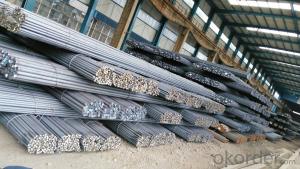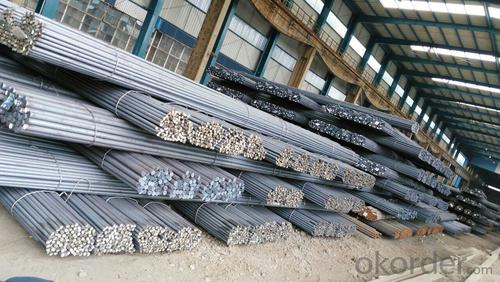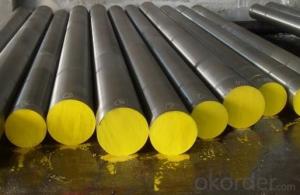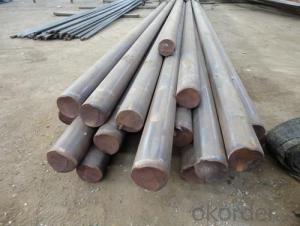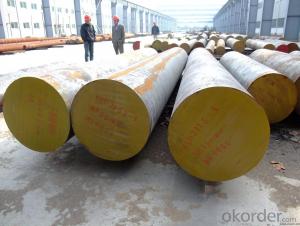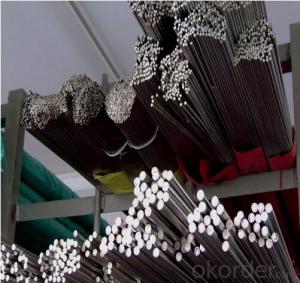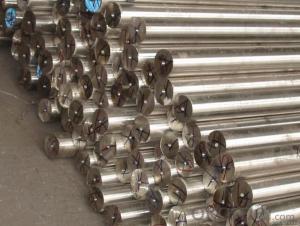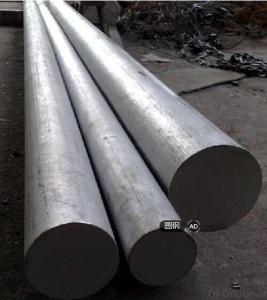1.2379 Tool Steel D2 Material Flat Bar Round Bar
- Loading Port:
- Tianjin
- Payment Terms:
- TT OR LC
- Min Order Qty:
- 25 m.t.
- Supply Capability:
- 50000 m.t./month
OKorder Service Pledge
OKorder Financial Service
You Might Also Like
Specification
1.2379 Tool Steel D2 Material Flat Bar Round Bar
Product Description:
1.Cr12Mo1V1 (D2) steel is the wider usd international belong to high carbon and high chromium ledeburite cold work die steel
2.This steel has high hardenability, hardened, abrasion resistance, high temperature oxidation resistance
3.Quenching and polishing after has good anti-rust, heat deformation small,
4.should be the manufacturing requirements of high-precision, long-life cold work die, props and gauges.
5.Grade: D2,1.2379,X160CrMoV12,BD2,XW-42.
Chemical Composition(%)
C | Si | Mn | Cr | S | P | Mo | V | Co | |||||
1.5 | ≤0.60 | ≤0.60 | 12.00 | ≤0.03 | ≤0.03 | 0.85 | ≤1.10 | ≤1.00 | |||||
Dimesions:
Flat Bar | |||||||||||||
Cold Work Tool Steel | Thickness: 20~450mm;Width:200~600mm | Length:2000~6000mm | |||||||||||
Hot Work Tool Steel | Thickness: 20~650mm;Width:200~1200mm | ||||||||||||
Plastic Mold Steel | Thickness: 20~600mm;Width:200~1200mm | ||||||||||||
Round Bar | |||||||||||||
Cold Work Tool Steel | Dia:20~600mm | Length:2000~6000mm | |||||||||||
Hot Work Tool Steel | Dia:20~650mm | ||||||||||||
Plastic Mold Steel | Dia:20~650mm | ||||||||||||
Dimensions can be customized | |||||||||||||
Application:
Suitable for impact and extrusion molds of high output,thread twisting molds,molds for ceramics, molds for electric circuit plates and plastic molds of high output.
We are professional manufacture of tool steel. We can provide various kinds of tool steel and mould steel. If you have any question regarding our products ,please feel free to let us know. We assure you will receive our best attention to your enquiry.
Product Show:
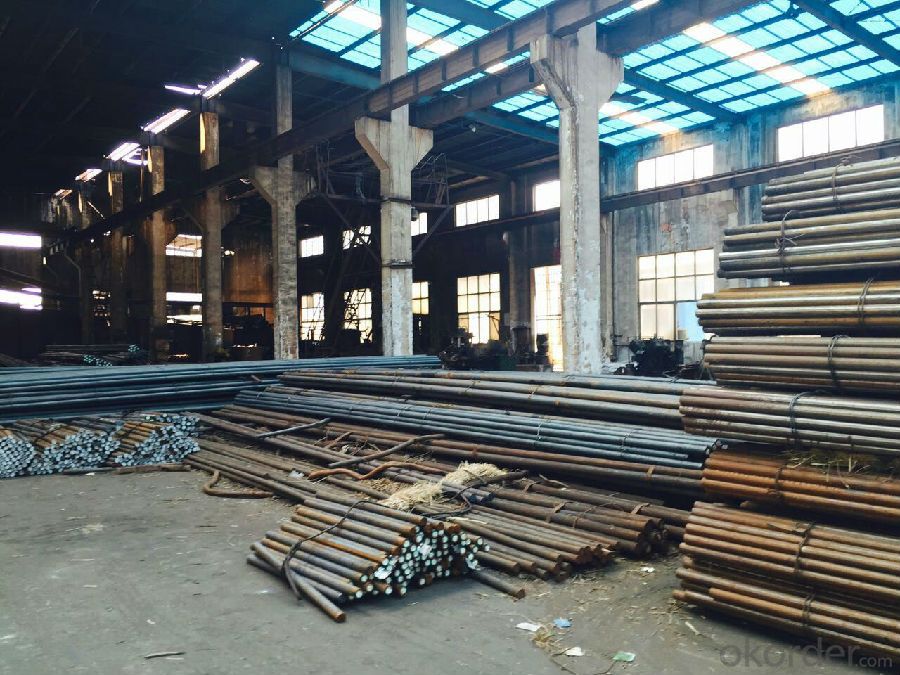
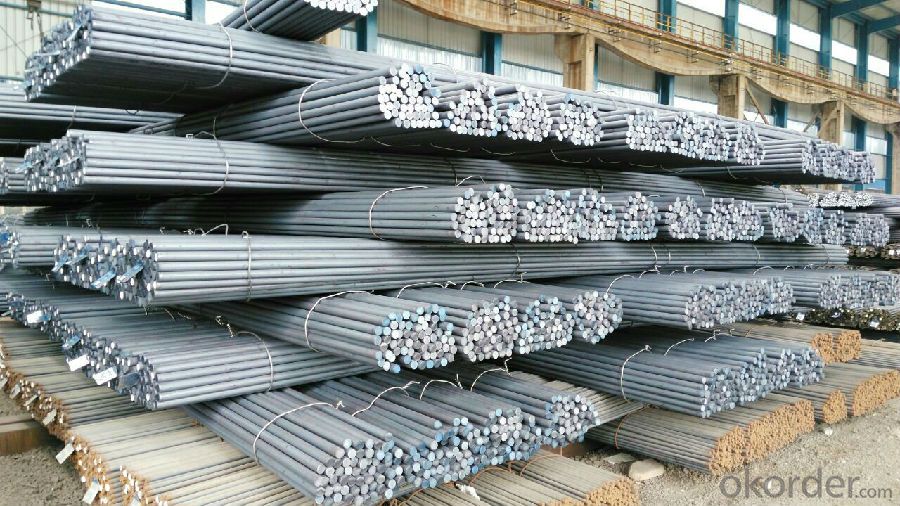
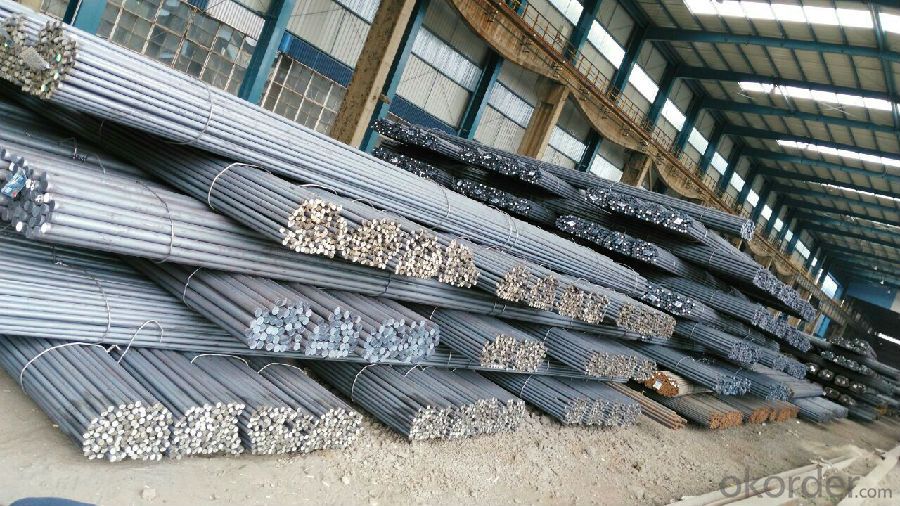
- Q: How does special steel contribute to the waste management industry?
- Special steel plays a crucial role in the waste management industry by providing durable and corrosion-resistant materials for various applications. It is used in the fabrication of waste containers, compactors, and shredders, ensuring their longevity and ability to withstand harsh environments. Additionally, special steel is utilized in incinerators and waste-to-energy plants, where its high heat resistance helps optimize the combustion process. Overall, special steel contributes to the waste management industry by enhancing the efficiency, durability, and sustainability of its equipment and infrastructure.
- Q: How does special steel contribute to the oil and gas machinery industry?
- Special steel plays a crucial role in the oil and gas machinery industry by offering exceptional strength, durability, and corrosion resistance. It is commonly used in the manufacturing of drill pipes, valves, pumps, and other critical components. The high tensile strength of special steel ensures the safe and efficient extraction of oil and gas, while its resistance to extreme temperatures and harsh environments enhances the reliability and longevity of machinery. Additionally, special steel's ability to withstand high-pressure conditions and prevent leakage makes it an essential material in the oil and gas sector.
- Q: How does special steel contribute to reducing product lead times?
- Special steel contributes to reducing product lead times by offering several advantages. Firstly, special steel is known for its high strength and durability, allowing manufacturers to produce parts that can withstand harsh conditions and heavy usage. This ensures that the products made with special steel have a longer lifespan, reducing the need for frequent repairs or replacements. Secondly, special steel can be fabricated into complex shapes and sizes, enabling manufacturers to produce intricate components with high precision. This eliminates the need for additional machining processes, saving time and reducing lead times. Lastly, special steel often has improved mechanical properties, such as higher hardness or heat resistance, which can enhance the performance of the final product. This allows manufacturers to meet specific requirements and deliver high-quality products more efficiently, ultimately reducing lead times.
- Q: What are the common challenges in heat treating special steel?
- Heat treating special steel can present a variety of challenges. One common challenge is achieving the desired hardness and strength while maintaining the desired microstructure. Special steels often require specific heat treatment processes, such as quenching and tempering, to achieve the desired mechanical properties. However, the high alloy content of these steels can lead to difficulties in achieving uniform heat distribution and controlling the cooling rate during quenching, which in turn can result in inconsistent hardness and potential distortion. Another challenge in heat treating special steel is managing residual stresses. During the heating and cooling process, differential thermal expansion and contraction can cause stress to build up within the steel, leading to potential cracking or distortion. Special care must be taken to minimize these stresses through proper heat treatment techniques, such as preheating and controlled cooling rates. Special steels often have stringent cleanliness requirements, as impurities or non-metallic inclusions can negatively impact their mechanical properties. Ensuring the cleanliness of the steel prior to heat treatment can be challenging and may require additional steps such as degreasing, pickling, or using protective atmospheres during heat treatment. Furthermore, some special steels are highly sensitive to overheating, which can lead to grain growth and loss of desired properties. Precise temperature control and monitoring are crucial to prevent overheating and ensure consistent results. Lastly, special steels may have specific time-temperature transformation (TTT) and continuous cooling transformation (CCT) characteristics that need to be considered during heat treatment. Understanding and adhering to the appropriate heating and cooling cycles are essential for achieving the desired microstructure and properties. In summary, the common challenges in heat treating special steel include achieving the desired hardness and microstructure, managing residual stresses, ensuring cleanliness, preventing overheating, and adhering to specific time-temperature transformation characteristics. Overcoming these challenges requires expertise, precise control, and adherence to strict heat treatment protocols.
- Q: How is special steel used in the construction supply chain?
- Special steel is used in the construction supply chain for various purposes. It is commonly used in the manufacturing of structural components, such as beams, columns, and reinforcement bars, due to its high strength and durability. Special steel is also utilized in the production of specialized tools and equipment used in construction, such as cranes, excavators, and drilling rigs. Furthermore, it plays a crucial role in the fabrication of pre-engineered buildings and modular construction systems. Overall, the use of special steel in the construction supply chain allows for the development of robust and efficient structures, enhancing the overall safety and longevity of construction projects.
- Q: What are the different methods of preventing intergranular corrosion in special steel?
- Various techniques are available for preventing intergranular corrosion in special steel. 1. Heat Treatment: A highly effective approach involves subjecting the steel to solution annealing, a heat treatment process. This method entails heating the steel to a high temperature and rapidly cooling it. By doing so, any precipitates or carbides that may have formed along the grain boundaries are dissolved, thereby reducing the risk of intergranular corrosion. 2. Alloying: Another strategy is to introduce specific alloying elements into the steel composition. For instance, the addition of elements such as chromium and molybdenum can enhance the steel's resistance to intergranular corrosion. These alloying elements create a protective oxide layer on the surface, preventing corrosion along the grain boundaries. 3. Passivation: Passivation involves treating the steel surface with chemicals that establish a protective layer. This layer acts as a barrier, safeguarding the grain boundaries from the corrosive environment. Common passivation techniques include acid pickling and electrochemical methods. 4. Sensitization Control: Particular attention must be given to controlling the sensitization process. Sensitization occurs when the steel is exposed to high temperatures for an extended period, resulting in the precipitation of chromium carbides along the grain boundaries and rendering the steel vulnerable to intergranular corrosion. By carefully controlling the heating and cooling rates during processing, sensitization can be minimized or prevented. 5. Corrosion Inhibitors: Another option is the utilization of corrosion inhibitors, which are chemicals that can be applied to the steel surface to protect it from corrosion. These inhibitors form a protective film on the surface, preventing corrosive agents from attacking the grain boundaries. It is important to consider that the choice of method depends on the specific type of special steel and its intended application. Selecting the most suitable approach requires a comprehensive understanding of the steel's composition, processing conditions, and the expected corrosive environment.
- Q: How does special steel compare to other materials, such as aluminum or titanium?
- Special steel is a highly versatile material that offers several advantages over other materials like aluminum or titanium. It is known for its superior strength, durability, and resistance to wear and corrosion. Compared to aluminum, special steel is typically stronger and more rigid, making it ideal for applications that require high load-bearing capabilities. In comparison to titanium, special steel often possesses similar or even greater strength, at a lower cost. Overall, special steel is highly valued for its outstanding mechanical properties, making it a preferred choice in various industries.
- Q: What is the chemical composition of special steel?
- Special steel is a type of steel that is specifically manufactured for particular applications, and its chemical composition varies depending on its intended use. However, some common elements found in special steel include iron, carbon, manganese, chromium, nickel, and molybdenum. The precise combination and quantities of these elements are carefully balanced to achieve specific properties such as enhanced strength, corrosion resistance, or heat resistance, making special steel ideal for specialized applications in industries like aerospace, automotive, and construction.
- Q: What are the different methods for tempering special steel?
- There are several methods for tempering special steel, each with its own advantages and considerations. Some of the common methods used for tempering special steel include: 1. Air Tempering: This method involves heating the steel to a specific temperature and then allowing it to cool in still air. Air tempering is often used for low alloy steels and results in a uniform hardness throughout the steel. 2. Oil Tempering: In this method, the steel is heated to a specific temperature and then quenched in oil to cool it rapidly. Oil tempering is commonly used for tool steels as it provides a good balance between hardness and toughness. 3. Water Tempering: Similar to oil tempering, water tempering involves quenching the steel in water after heating it to a specific temperature. This method provides a higher rate of cooling and results in a harder steel, but it may also lead to increased brittleness. 4. Salt Bath Tempering: In this method, the steel is immersed in a molten salt bath at a specific temperature. The salt bath provides a more controlled and uniform heat transfer, resulting in a consistent hardness throughout the steel. 5. Cryogenic Tempering: Cryogenic tempering involves cooling the steel to extremely low temperatures, often below -100°C (-148°F), using liquid nitrogen or helium. This method helps to further reduce residual stresses and increase the wear resistance of the steel. It is important to note that the specific method chosen for tempering special steel depends on various factors, including the type of steel, desired hardness, intended application, and the desired balance between hardness and toughness. It is crucial to follow proper heat treatment guidelines and consult with experts to ensure the best results for a specific steel alloy.
- Q: Can special steel be used in the manufacturing of consumer goods?
- Yes, special steel can be used in the manufacturing of consumer goods. Special steel, with its superior strength, durability, and corrosion resistance properties, can be utilized in various consumer products such as kitchen appliances, cutlery, watches, automotive parts, and electronics. Its use enhances the performance and longevity of these goods, making them more reliable and efficient for consumers.
Send your message to us
1.2379 Tool Steel D2 Material Flat Bar Round Bar
- Loading Port:
- Tianjin
- Payment Terms:
- TT OR LC
- Min Order Qty:
- 25 m.t.
- Supply Capability:
- 50000 m.t./month
OKorder Service Pledge
OKorder Financial Service
Similar products
Hot products
Hot Searches
Related keywords
